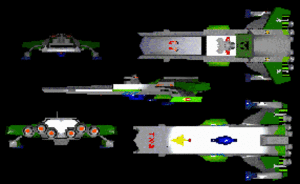Bengal-class strike carrier
| Bengal-Class Strike Carrier | |
|---|---|
| File:Wc1bengal.jpg | |
| Retrofitted TCS Tiger's Claw circa 2654 | |
| Type | Strike Carrier |
| Manufacturer | Trojan Four Spaceyards |
| Primary User | Terran Confederation |
| Introduction | 2619 |
| Length | 625 meters (2619), 700 meters (2644), 690 meters (2645) |
| Mass | 55,000 metric tonnes (2619), 80,000 metric tonnes (2644), 60,000 metric tonnes (2645) |
| Max Velocity | 130 kps |
| Cruise Velocity | 100 kps |
| Acceleration | poor |
| Max Y/P/R | 1/1/1 dps |
| Missiles | 40 Torpedo Tubes |
| Turrets | Dual Mount Laser Turret (22), Dual Mount Laser Battery (8) (2619), Dual Mount Laser Turret (20), Dual Mount Laser Battery (8) (2644-45) |
| Armor | 24 cm fore/20 cm aft 25 cm sides |
| Shields | 21 cm fore/aft |
| Fighter Complement | 104 |
| Decoys | None |
| Cloak | No |
| Jump Drive | Yes |
| Crew | 600 (2619), 750 (2644-45) |
The TCS Bengal was comissioned in 2619, the first in a series of "utility carriers" that would go on to serve in both independant and fleet roles for the duration of the Terran-Kilrathi conflict. The initial model of Bengal saw service throughout the Pilgrim conflict and the first years of the Terran-Kilrathi war. Generally outclassed by the more modern Concordia-Class and the more common Ranger-class ships, Bengals seemed doomed to spend their life as a second class support carrier.
At least, until 2642, when Terran Confederation military command authorized the conversion of remaining in-production hulls to the heavily revised second flight design. The first of the new ships, the TCS Tiger's Claw (CV-07), was comissioned at the Trojan IV shipyard two years later (2644). It was included in Joan's Fighting Spacecraft Vega Sector Supplement for 2654.092.
The Tiger's Claw immediately began what would become one of the most storied individual combat records in history, routing a Kilrathi invasion force while still on her shakedown cruise. Minor design changes to ensuing Bengals reduced their total length to 690-meters, the TCS Kipling being the first Bengal to reflect these changes -- making the 700-meter Tiger's Claw the largest strike carrier in the fleet.
The Bengals were designed to undertake deep-space assaults against Kilrathi positions without the need for escorting vessels. These ships were designed as all-purpose vessels that could operate without escorts or assistance in combat.
The TCS Tiger's Claw was by far the most famous ship of this class. Among her exploits, she routed a Kilrathi invasion force, liberated the Vega Sector in 2654, destroyed the Kilrathi fleet responsible for the destruction of Goddard in 2655, and ensured the entry of the Firekkans into the Terran Confederation later that year following a massive Kilrathi invasion. Some of the finest pilots ever to serve in the Confederation Space Navy served aboard the Claw, including Christopher Blair.
The final Bengal-Class carrier was commissioned in 2657. By the end of the decade, they were replaced by the more modern Jutland-Class Heavy Carriers. However, surviving Bengals continued to serve the Confederation with distinction throughout the remainder of the Kilrathi War. TCS Wolfhound served into the late 2660s, notably at the Battle of Vukar Tag where it and the TCS Concordia were the only two Confederation carriers to escape undamaged. It served as Admiral William Banbridge's flagship before and during the battle.
Notable Vessels
- TCS Beacontree
- TCS Bengal (Class Leader)
- TCS Eagle's Talon
- TCS Exeter
- TCS Kipling
- TCS Kyoto
- TCS Tiger's Claw (Destroyed 2656)
- TCS Trafalgar (Destroyed 2668)
- TCS Wolfhound
- TCS Vanguard
Images
TCS Tiger's Claw as seen in Wing Commander Academy TV series.
Fan Art
Over the years many fans have contributed their artwork showcasing the Tiger's Claw.

